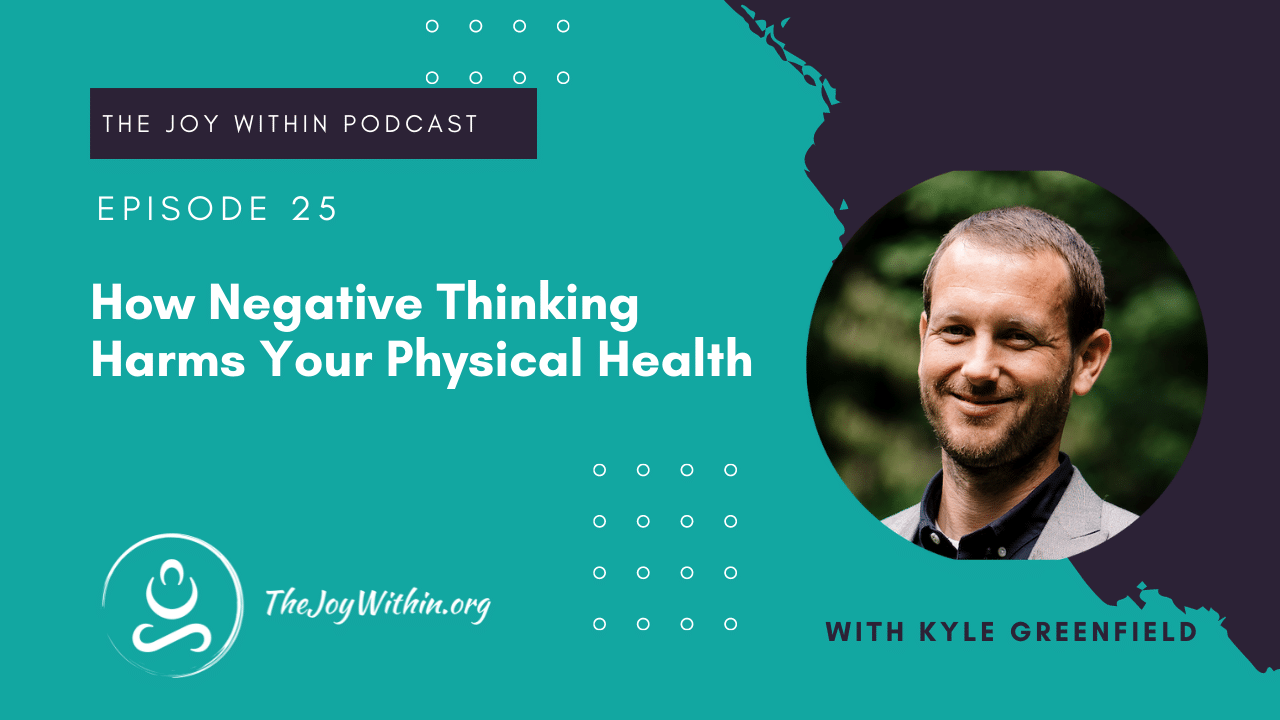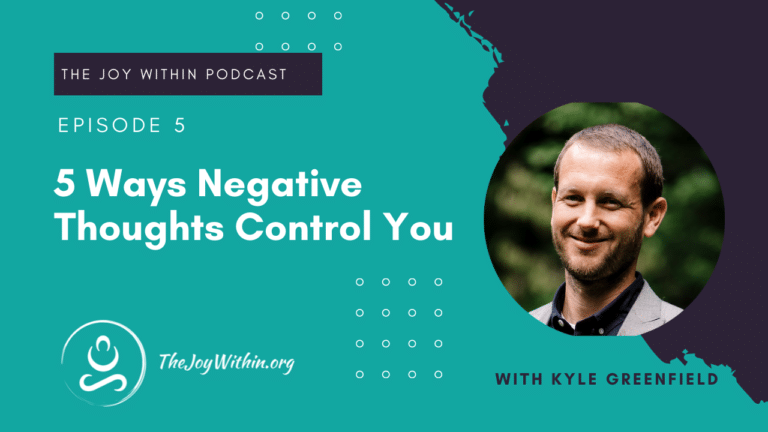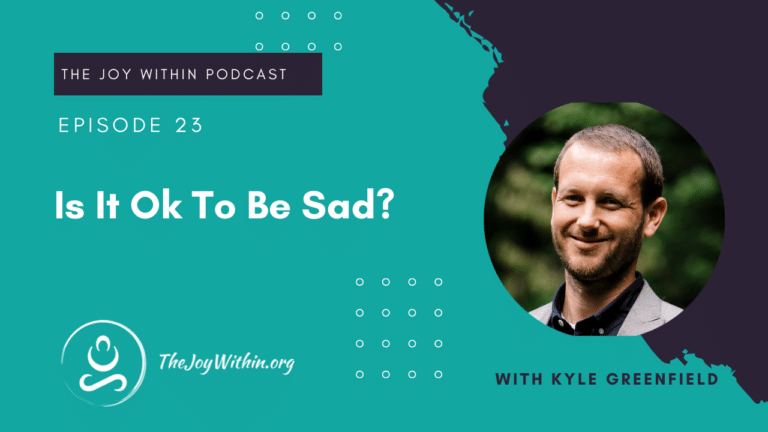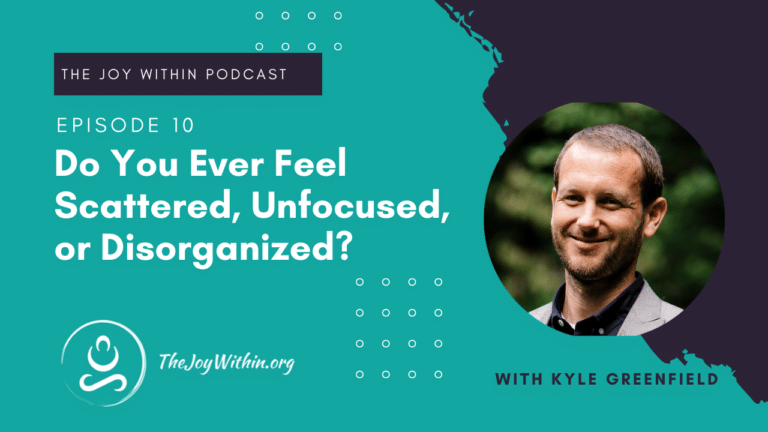Hello and welcome back to The Joy Within’s podcast. Today we’re talking about the first of the five major costs of negativity, which are the physicals costs, or – as I like to say – the cost of crashing and burning.
This category can take a variety of forms, so while I can’t cover everything, hopefully the examples from today’s episode will help you to pinpoint how these costs might be playing out for you.
I think the biggest challenge that comes with identifying the physical cost of our thoughts is that this, more than any other of the five categories, we tend to think of as external. Except in extreme cases, we don’t blame our health on our thoughts. We look to the world around us. We might blame our diet, our environment, our job, or even our genetics – but rarely do we blame our consistent thoughts.
So, to help crystallize this connection, I want to play-out a couple of examples of the more extreme end of the spectrum, and then we can walk them back to the earlier, more minor stages.
First, I want you to think about someone who is depressed. What comes to mind? I always think of someone sitting on the couch, mindlessly watching tv and eating junk food for hours on end, because – frankly – I’ve been there.
Other people might stop eating entirely, or start drinking, or engage in other destructive behaviors, all of which can be equally unhealthy, but we’ll stick with the couch potato example for now. So, think about what will happen if this person doesn’t recover. If he stays depressed for extended periods. He’s depressed, which means he’s sluggish. He’ll move less. and won’t be motivated to exercise. Plus, he’s eating junk food, so he’ll gain weight. Gradually, his body will start to feel worse, so he becomes even more tired and depressed. It becomes a vicious cycle, and if that keeps up, he’ll start to develop other health issues. Heart disease. Diabetes. Joint problems. Bit by bit, all of these different issues begin to stack against him. And, after a while, breaking out of that cycle starts to seem impossible.
It’s a similar story when it comes to stress. Stress can lead to over-eating and weight gain, or minor substance addictions, or it can lead to reactions that – on the surface – might look healthier (like trying to exercise your way out of the stress), which in turn can lead to other addictive tendencies, or obsessive-compulsive behavior, anxiety, panic attacks, migraines, gut issues, and so on and so forth.
At the very least, these surface-level habits fail to deal with the root cause of the problem, so the stress doesn’t go away. It builds, often beneath the surface where you can’t see it, until it pushes you into total burnout. I’ve actually experienced a pretty bad version of this myself. back in 2012 I was running a company that wasn’t doing very well, and I’d go on these long runs around San Francisco trying to get all of my energy out. It worked for a while, but what I didn’t know was that I wasn’t actually dealing with anything. The little voice in my head – the cause of my stress – just gradually got louder and louder, until I basically just collapsed, completely burned out. I lost pretty much everything and literally went and got on a boat headed for Mexico.
Whatever form it takes for you, ultimately if you don’t deal with the real cause – the underlying thoughts – the cycle will continue to get worse.
Notice how I just said that: Your underlying thoughts are the real cause of the problem. The depression, or stress, and all those other, related problems are just symptoms. A lot of people point to the external issues as the cause – they point to stress at work, or depression from a breakup or failure of some sort, but those events are just the triggers. The root cause is the way you think about those events.
Again, this can take a lot of different forms, but I hope these examples make it clear how negativity can spiral into truly horrible health consequences.
Because here’s the tricky part. Now we have to back this up and see how it applies to everyday life, because chances are, you’re not just staring at the tv popping Doritos into your mouth all day. Usually, by the time you get to that point, you know there’s a problem. The real question is: how do we identify the pattern before it spirals out of control? How do we know we have a problem before we really have a problem?
To do this, I’m going to suggest 2 different approaches you can use. First, I want you to think back to the last time you had a bad day. Maybe you were stressed or upset about something, or maybe you just felt a bit down. What did you do? Did you treat yourself to a little extra chocolate? Make comfort food instead of a healthy meal? Reach for a glass of wine?
Or, maybe you just felt tired, so you plopped down when you got home and skipped your workout. Or, maybe your bad day made it harder for you to unwind and you had trouble falling asleep.
Try to think objectively and pinpoint your response. And I want to be clear there is nothing wrong with anything I just listed. The point is to discover the connection between your emotional state – the fact you had a bad day – and the action you took in response to that.
If you can establish that connection, you can play with it in your mind. Extrapolate it out. What would happen if you did that every day? The key here is to realize that – most of the time – we don’t think about how little actions and habits can compound over time. If, for example, you have a glass of wine whenever you have a tough day at work, on the surface, there’s nothing wrong with that. There’s nothing wrong with enjoying a glass of wine. But, if the cause of wanting that glass is stress, or depression or some other negative state, you have the seed of a potential problem, because you’re giving the decision – the power – over to your negative emotional reaction. Over time, bad day at work begins to equal wine. Your brain literally wires and rewires that connection, like weaving a thick, unbendable rope from a series of small threads. Pretty soon, any stress equals wine. The habit grows. You start having a little more, a. little more often.Extrapolate that out and it leads to ill-health or alcoholism.
Again, it’s not the action that is bad or wrong, it’s the connection between the negative emotional state and the automatic response you have. That’s what triggers the potential for long-term repercussions. That’s what gets harder and harder to break, the longer you continue with it.
I know this might sound extreme, and I’m not trying to scream that the sky is falling if you have a few bad habits. Everyone has a few negative tendencies. I’m drawing this out so – hopefully – the connection becomes crystal clear in your mind, long before you have any problem at all. Because only when you’re clear on these connections will you have the power to make whatever choices are right for you.
The other approach to noticing these connections is to think about the positive intentions you set for your health, and what happens when you don’t follow through on them. So, maybe you want to exercise more or eat healthier or stop watching tv before bed so you can sleep better – whatever it is for you. On days when you don’t do that, ask yourself: why not?
And, chances are, your first response is going to be something like “Oh, well I was tired,” or “I just didn’t feel like it,” but I encourage you to probe a little deeper. Often it comes down to a question of willpower and resilience –> which you have in limited supply, by the way. And, you might not realize it, but all of the little negative thoughts you have throughout the day chip away at that resilience. Even if the negativity is completely unrelated to whatever your positive intention was. You literally weaken your ability to create the better, healthier habit you want, because of the negative thoughts you might not even notice you’re thinking.
When I first learned that I was dumbfounded. I mean, think about that: little thoughts you – most of the time – don’t pay attention to, thoughts you might not even know you have, can chemically alter your brain so you don’t do or achieve the things you want. Even if those thoughts are completely unrelated.
Complaining about the line at the supermarket stops you from wanting to exercise.
Listening to your coworker rant about her fight with her partner stops you from eating healthily.
Worrying about your child’s grades makes you binge-watch reality tv.
All because those thoughts wear down your willpower and resilience. It’s like all of those little negative thoughts are weights, and your brain can physically only lift so much.
That’s why you have to pay attention to this. You have to be able to pick out these thoughts before they drag you down. Before they push you into a negative spiral.
Because if you catch them early, you can train yourself to respond differently. You can not just take weight off the bar, so to speak, but you can also train your mind to become stronger, so that it can handle more of whatever life throws at you.
Because just like those little negative thoughts can create a vicious downward spiral, the reverse is also true. Small positive steps – tiny shifts in the way you respond to the world – can quickly add up to create massive positive results in your life. That’s how you kickstart a world in which you can become unstoppable, because peace, joy, and well-being become the foundation for everything you experience in your life.




